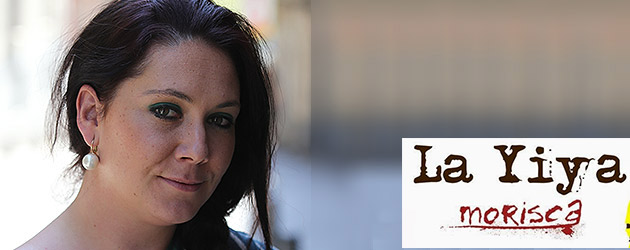Interview: Silvia Cruz Lapeña
Cover photo: Rafael Manjavacas
Interview with Ana María Ramírez, «La Yiya» , new recording «Morisca»
“Flamenco associations and festivals mistreat young singers»
Before starting work on her record, Ana María Ramírez was five years without singing, enjoying a maternity she wears tattooed on her right forearm and which she assures us is the reason for waking up every day. «My three children are why I retired from singing, to enjoy them, and now they're the motor than pushes me to work and go out to the street each day». She returned to her career, took the name of La Yiya in honor of her grandmother who was known as Yiyi and set about fulfilling the promise she had made to herself to make a record before the age of 30. The result is Morisca (La Droguería Music, 2014), which takes the name of the inhabitants of La Puebla de Cazalla.
There are many references to La Puebla and to that maternity in the verses of the record Morisca, verses created by Manuel Velázquez following the biography of Ana María, and the style of another illustrious La Puebla native, Francisco Moreno Galván. «Pa' qué quiero más tesoro que los tres niños que tengo» ('what greater treasure could I want than the three children I have'), she sings in bulerías, and «De la rama de un árbol, se harán tres cunas, que tendrán de almohada seda y espuma» ('from the branch of a tree, three cribs will be made, and the pillows are of silk and foam'), she sings in the nana which the singer says is her favorite piece on the record. «Manuel Velázquez saw me sing in Seville, and said the day I made a record, he'd write the verses for me. He sat down with me, asked me things about my life, he had me tell him anecdotes and talk about my feelings, and these songs came out which are really beautiful», explained Ana María to Deflamenco.com.
An intense life
Perhaps part of the beauty of the plaintive singing and the verses on this record, comes from the intense life of Ana María who began to work on this record with her partner, Miguel Ángel Carrillo, who died before the project became a reality. «It was something we were doing together, and suddenly I was all alone. It was very hard, and that in part is why I stopped working on it. When I picked up the project again, it was difficult, but the help the guitarist who accompanied me, Antonio García, and the unconditional support of Chemi López, were fundamental in being able to continue moving forward».
Ana María is young, 30 years old, but she says she is not the same person of a few years ago. When asked about the old chestnut that says you sing flamenco better if you've suffered, she doesn't doubt for a second, and answers with a straightforward «yes». «I'm not the same person in flamenco, nor in my life. When I sing siguiriyas, which is my favorite form, I feel it differently. I've been through a lot: my sister died, my father and my boyfriend, and when I sing, I'm braver» says Yiya who maintains that all those experiences also made her more aware of who she is and what she has.
Doing it right
La Yiya prefers not to get involved in discussions about «pure» and «jondo», but when asked to name the singers she likes best, she blurts out the names without hesitation: “Encarnita Anillo, La Macanita, José Valencia and of course, José Menese”, thus giving herself away. Menese is a central figure in Ana María's career, he took her under his wing and she sees in him a «fundamental pillar» of her singing.
Although Ana María sometimes speaks more with her eyes than her mouth, she also follows in the footsteps of her maestro when it comes to denouncing loud and clear things she doesn't like. One of these topics is the present and future that awaits the generation of young artists she belongs to. «The flamenco peñas and festivales mistreat us, they don't open doors for us. I understand there have to be major stars at an event, but not everything can be stars because young people have no way to move forward» she explains, adding that it's very difficult to live from flamenco. «In order to do it, you have to be on the move all the time, like ferrets digging around, always looking for the next gig before you've even finished the one you're working on», she adds not bitterly, but sternly.
«I'm the master of my silence, and the slave of my words», is the verse of toná with which La Yiya opens Morisca. But she says the words clearly and fearlessly, or you might say, bravely.
